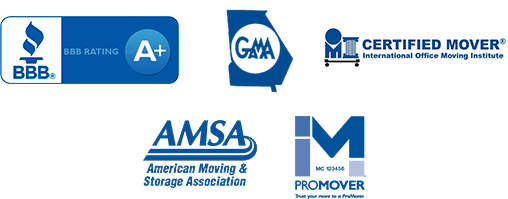When moving and working with a moving company you will come across terms that are frequently used in the moving industry. To assist you with understanding what these terms mean, Bulldog Movershas put together a frequently used terms list. If there is a term that you do not understand that is not on this list, please contact your moving specialist for information.
Accessorial Services – Services performed by your movers that are not part of their standard services. These can include things like bulky article moving, stair carries, etc.
Advanced Charges – Charges for moving services not performed by the moving company but by a professional, craftsman, or other such third party at the owner’s request. These charges will be paid by the mover and added to the owner’s bill of lading charges.
Agent – a moving company representative that is authorized to work with you on the moving companies behalf. This may be an employee or a partner of the moving company.
American Moving & Storage Association (AMSA) – A non-profit organization associated with the moving and storage industry. Good source of Residential Moving information.
Appliance Service – Preparation of major appliances for transportation in order to make them safer to transport.
Auxiliary Service – A second, smaller vehicle, that is used if a full-size trailer can not get to either your new location or your old location. This is sometimes called a shuttle service as it shuttles your belongings from your premises to the trailer or vice versa.
Bill of Lading – a receipt for the customer that is provided by the moving company which acknowledges receipt of the customers personal belongings for transportation. The customer signs this document which acknowledges that the moving company has permission to load the items onto their truck and that the customer has released their personal possessions to the moving company for transport.
Binding Estimate – an agreement made in advance between a customer and the moving company that guarantees the total cost of the move based on the quantities and services shown on the estimate. This estimate can not be altered or changed by either parties once signed unless both parties agree in writing.
Booking Agent – This person accepts orders for moves and registers the moving crew and truck needed to complete the move.
Build Out – The process of constructing your new space to accomodate your office moving into it. This can mean building walls, constructing offices, or electrical/wiring work.
Bulky Items – an item that requires special arrangements to move. This could be a car, motorcycle, big screen tv, or essentially any item that requires special arrangements to move. These types of items can come at an additional charge.
Carriage – The service provided by the moving company.
Carrier – Another name for a moving company.
Carrier Liability – The limit of what a moving company will pay for damages.
Certificate of Weight – Official document that specifies the weight of your shipment.
Claim – a statement of loss, damage, or delay to a household shipment while in the care of the moving company or it’s affiliate.
Clean Receipt / Clean Bill of Lading – Document stating that the entire shipment was received at the new location with no damage.
Concealed Damage – Damage that is not immediately apparent when items are unloaded at the new location.
C.O.D. (cash on delivery) – these are shipments where the customer pays the moving charges when the delivery of the item is made to its final location. Each moving company has different policies regarding C.O.D. shipments and may or may not allow such shipments to be made. If a C.O.D. shipment is allowed then cash is required at delivery to receive the items and a credit card may be required to secure the shipment ahead of time.
Declared Value Protection – Insurance based on the value set by the owner of the goods being moved.
Department of Transportation (DOT) – this is the federal agency which controls the industry for interstate transportation, including moving companies that cross state lines.
Diversion – when a shipment changes destination due to a customer’s request after the shipment is en route. Transportation charges will be calculated from the point of origin to the point of diversion plus the transportation charge from the diversion point to the new destination point.
Dunnage – Extra blankets, pads, or other filler material required to prevent damage to goods while being moved.
Estimate – There are several types of estimates. When the word estimate is used it usually refers to a non-binding estimate for the cost of a move.
Exclusive Use of Vehicle – An exclusive unit provided to a client for moving. This can be requested and the moving company may provide it. This is not usually used for local moves or intrastate moves as the truck being used is already exclusive.
Expedited Service – At the owner’s request, a moving company may agree to expedite the move and in return the owner agrees to charges based on a higher minimum weight.
Extra Labor – a description of charges that may apply if additional personnel are required to complete either the packing, unpacking, or moving of household or commercial items during a move.
Extra Pickup or Delivery – charges that can apply if there are additional stops required during the move or additional pickup or delivery of materials requested during a move.
Flight Charge – Also called a stair carry, this is a fee charged to move goods up and down stairs. The more stairs involved, the higher the charge.
FMCSR – Federal Motor Carrier Safety Regulations. These are the rules that govern interstate moving companies.
Fuel Surcharge – a charge that may apply to assist the moving company in recovering additional costs for fuel. This charge, which can change monthly, is based upon the national average for fuel as reported by the U.S. Department of Energy.
Full-Service Packing & Unpacking – A full service offered to both pack and unpack the goods being shipped. These types of services will also include charges for the packing materials needed, the labor required to pack and unpack, and the cost to remove packing debris.
Indemnification – Protection against loss or damage.
Insurance-Related General Increase (IRR Surcharge) – A percentage adjustment to the transportation charge for the increased cost of carrier’s liability insurance coverage expenses.
Interstate – State to state moves. Moving companies doing this kind of move must have federal licensing.
Intrastate – Moving inside of the state. Moving companies doing this kind of work must be licensed with the Georgia Public Service Commission.
Inventory – A detailed list of the goods being moved and the condition of said goods at time of packing or loading (if the mover is not packing the goods).
Liability Insurance – Mandatory insurance for moving companies to cover injuries, damage, and other risks.
Local – Moving that occurs within a specified area or region. These moves are always inside of state lines and should be complete in 1 day.
Long Carry – This is a charge that can be applied if the distance from your location to the truck is a long distance. This charge can be included in the set rate or it may be listed as a line item charge.
Method of Payment – The terms set forth by your moving company that outline how payment will be accepted.
Non-Binding Estimate – This is a basic estimate of cost. This is not a guess but a calculated figure arrived at through a firm understanding of the move requirements. Moving companies have calculations that are used based on weight, cubic feet, mileage, cost of personnel, and number of personnel required. Your final bill may vary from this kind of estimate based on your actual move requirements on move day.
Order For Service – This is a document that the moving company has authorizing them to transport of your goods.
Order Number – This is a number assigned by your moving company to your belongings that is used to identify said items. This number should be present on your Order For Service as well as your Bill of Lading. Use this number when contacting the moving company.
Origin & Destination Service Charge – A rate that is added to your moving charge based on the locations where the goods are picked up and/or where the goods are delivered. These charges are used to compensate the moving company for handling and servicing of the goods. It includes services such as elevator, stair and excessive distance, piano and organ flight carries, additional transportation charges, basic appliance servicing (getting the appliance ready for moving), and on shipments moving across country borders.
Overflow – Goods that are left behind due to insufficient space on the moving vehicle. An additional vehicle will be utilized for transportation and delivery of these overflow goods.
Overtime Loading & Unloading Service – An overtime charge applied to a move when the move is requested to be handled, on either the original location or the new location, at off hours times. These can include after or before normal working hours, days of a week when the mover is normally not working, holidays, or when laws or landlord requirements will not allow delivery during normal hours.
PBO – This stands for Packed By Owner. When items are packed by the owner for moving it is commonly referred to as PBO items.
Pre-Existing Damage – Damage that exists on your belongings prior to possession by the moving company.
Relocation Center – This is a place where services are provided to businesses and individuals moving to new areas. They provide information, can assist with finding a home, and offer other help as needed. Usually these centers are run by moving companies or real estate companies.
Relocation Management Company – A company who is hired to run corporate relocations. They provide services like a relocation center. Additionally, they administer corporate relocation policies, buy homes from employees based on said policy, and provide legal and financial services.
Relocation Policy – A companies set guidelines for how they agree to handle an employee move. These usually outline things like reimbursements, benefits, and the types of services they will agree to pay for.
Reweigh – Before goods are actually unloaded a reweigh of the shipment may be requested. If one is performed the actual charges will be based on the results of such weight regardless of whether it is higher or lower than the first weight taken.
Shuttle Service – See Auxiliary Service.
Stair Carry – See Flight Charge.
Storage-in-Transit – This is temporary storage of your goods in a warehouse of the moving companies choice, pending delivery at a later date.
Stowage – This is how your items are packed into the moving truck. Items should be packed with the heaviest items on the front with weight evenly distributed along both sides. Whenever possible, items that are to be moved into the new location first should be on the back of the truck to be unloaded first.
Tariff – This is a moving companies price list. In the state of Georgia a maximum tariff is set by the Georgia Public Service Commission. Tariffs are required to have detailed pricing and rules regarding all services provided.
Third-Party Services – These are services provided by someone other than the moving company or its agents at the owners request or as required by law.
Valuation – This is a charge applied to a move when the owner’s goods are in the care of the moving company. This is not insurance and should not be confused as such.
Van – Moving industry term for all moving trucks including tractor-trailers.
Van Line – Another term for a moving company.

















